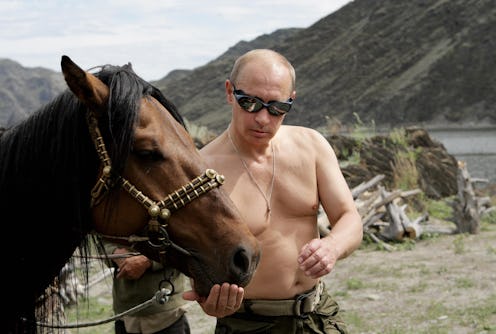News
What Trump's Win Means For U.S.-Russia Relations
While pundits and pollsters were attempting to fathom how Donald Trump defied expectations and odds to beat Secretary Clinton, Russian president Vladimir Putin was busy sending Trump a note of congratulations. That Putin did so by sending a telegram illustrates either an eccentric aversion to basic modernity, or (more likely) a symbolic message of how Putin sees the new American president-elect: as a return to the old days of U.S.-Russia detente. A renewal of the Cold War era, with two "equal" powers vying for the upper hand, just what the Russian leader has been after for years.
Essentially, Putin wants to legitimize his un-democratic form of authoritarianism. His rejection of western liberality is long and well-documented, from jailing political opponents and vocal dissidents, to widespread campaigns of disinformation and accusations of sham elections. As a former KGB agent, Putin was devoted to the old way of doing things, and lamented the loss of the Cold War as "the greatest geopolitical catastrophe of the century." When formerly Communist countries embraced democracy, Putin saw tragedy.
This would not be so alarming if Putin led a small country with little influence. But since the 2008 invasion of Georgia, Putin has been increasingly present on the world stage. Most recently, he's taken Russia into the Syrian civil war. And military action there indicates not only Russian openness to essentially play chicken with the U.S. military; it demonstrates an openness to working alongside genocidal dictators.
Under the auspice of fighting ISIS, Putin teamed up with Syrian president, Bashar al-Assad. But targets have been civilian rebels, not ISIS, with Russia dropping bombs even on hospitals filled with children. Syria has been torn apart by a civil war, begun over five years ago by rebels fed up with Assad's incompetent and oppressive government. Since then, nearly 500,000 civilians have been killed, and millions more displaced, leading the U.N. to mark the state of Syria as "the greatest humanitarian emergency of our era."
Normally, the United States doesn't team up with regimes that openly target and murder children. But Donald Trump is no orthodox politician. His admiration of Putin dates pretty far back, with this now infamous tweet from 2013:
And during the presidential debates, Trump refused to clarify whether or not he would intervene in the humanitarian crisis of Aleppo, a Syrian city marked out for devastating attacks by Assad and Putin. Trump deflected, lamented the situation, but ultimately said it's pretty much America's fault. After all, Assad is "tougher" and "smarter" than Clinton or Obama.
For the record, Aleppo has not fallen. And criticism of Obama and Clinton is certainly on the table, especially considering Obama's promise to intervene in Syria, should Assad use chemical weapons. (After evidence surfaced that Assad had released sarin gas on civilians, Obama demurred, sending the decision to Congress. No bombing ensued.) But to elevate a monster like Assad simply because he is willing to slaughter his own people was an altogether new and frightening take from a presidential nominee.
Add to this the fact that Russia hacked the Democratic National Committee (WikiLeaks dumped the stolen emails online before the election), and it looks like Putin is in full power-play mode. How many Americans imagined that 2016 would be the year Russia finally influenced an American election? My grandparents would be horrified.
Trump's admiration for "toughness" over all else should alarm every American. Even more so now that he is President-Elect, the fact that Trump has made befriending Putin a political goal should be a top concern for all. One hopes elected leaders in Congress and elsewhere will hold Trump accountable. But given the way this election has panned out, all bets are off.
